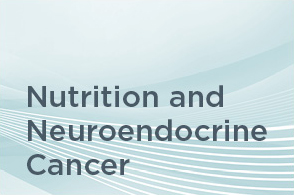By Anna Greene, PhD, NETRF Director of Research
 An important advancement in neuroendocrine neoplasm (NEN) patient care has been released: the Position Statement on Nutritional Support in NENs from the European Neuroendocrine Tumor Society (ENETS), recently published in the Journal of Neuroendocrinology.
An important advancement in neuroendocrine neoplasm (NEN) patient care has been released: the Position Statement on Nutritional Support in NENs from the European Neuroendocrine Tumor Society (ENETS), recently published in the Journal of Neuroendocrinology.
Nutrition has long been overlooked in NEN management, despite its critical influence on patients’ metabolism, nutrient absorption, and overall well-being. Malnutrition and sarcopenia (loss of muscle mass and strength) affect 38 to 61% of NEN patients, though this figure varies across studies since there are no standardized evaluation standards. Without structured guidance, treatment tolerance suffers, hospital stays lengthen, quality of life declines, and survival may be shortened.
This position statement fills that gap by recommending routine nutritional screening, tailored interventions, and multidisciplinary care, ensuring that individuals with NENs receive personalized, evidence-based nutritional support.
At NETRF, we are proud to highlight this guidance, which addresses a long-standing gap in our field. For too long, nutrition, a fundamental aspect of health, has been neglected and under-researched in NEN management. This publication changes that.
Why Nutrition in NENs Matters
NENs are complex and heterogeneous conditions that affect not just specific organs but also influence the entire body’s functioning, including metabolism, nutrient absorption, and body composition. Malnutrition, sarcopenia, micronutrient deficiencies, and treatment-related weight changes are common. However, until now, formal guidance on addressing these issues has been lacking.
The ENETS consensus is a call to action: nutritional health must become an integrated, standardized part of NEN care.
Key Highlights from the ENETS Statement
- Malnutrition is widespread but underdiagnosed
Up to 61% of patients with NENs suffer from malnutrition or sarcopenia, even if their body weight appears normal. Aggressive neuroendocrine carcinomas (NECs) trigger a hypermetabolic state that induces cachexia, a syndrome of extreme muscle and fat loss. These conditions are linked to poorer outcomes, longer hospitalizations, and higher healthcare costs. - Why are NEN patients malnourished?
From hormone-secreting tumors to treatment side effects and surgical complications, multiple pathways lead to nutrient loss, poor absorption, and increased metabolic demands. Conditions like diarrhea, pancreatic enzyme deficiency, and short-bowel syndrome further compound the issue. - Micronutrient deficiencies are common
Vitamin B12, niacin (B3), and vitamin D deficiencies are especially prevalent in patients with carcinoid syndrome, bowel resections, or those treated with somatostatin analogues (SSAs). Patients should be routinely tested for nutrient deficiencies and supplemented as needed. - Validated tools should be used
ENETS recommends routine screening using validated malnutrition screening tools, paired with personalized assessments and dietary interventions. - There’s no one-size-fits-all diet
Dietary advice must be tailored to disease type, stage, and treatment. Patients often require targeted support, including oral supplements, enzyme replacement therapy, or even enteral or parenteral nutrition in severe cases. - Obesity and metabolic syndrome in NENs
Obesity is emerging as a potential risk factor in certain cancers, but it is not yet known if obesity is linked to NENs. Use of DPP-IV inhibitors and GLP-1R agonists in obese/diabetic NEN patients must be individualized. Long-term effects of these drugs on NEN progression aren’t established; decisions should be made via multidisciplinary teams, and cardiovascular risks monitored. - Expand nutrition-focused research in NENs
Nutrition in NENs is understudied despite its clear impact on outcomes. Priority action areas include large-scale clinical trials testing dietary interventions (e.g., Mediterranean vs ketogenic diets), developing standard nutritional assessment tools, and integrating nutrition endpoints into existing and future NEN studies to generate evidence-based care protocols.
What This Means for Patients and the Research Community
- Empowering patients: This paper acknowledges the real-life challenges of managing NENs and highlights nutrition as a vital component of treatment. It encourages patients to advocate for dietary support and motivates healthcare teams to routinely evaluate nutrition in their care plans.
- Call to action for researchers and advocates: This guideline lays out a roadmap for advancing NEN care. It urges academic societies, funding bodies, and foundations to invest in studies that unravel the biological links between nutrition and NEN development, progression, and outcomes—ultimately paving the way for interventions that optimize patient well-being and survival.
Visit the NETRF NET Knowledge Center for more nutrition resources, including our NETWise podcast on nutrition, as well as videos from neuroendocrine cancer experts.
